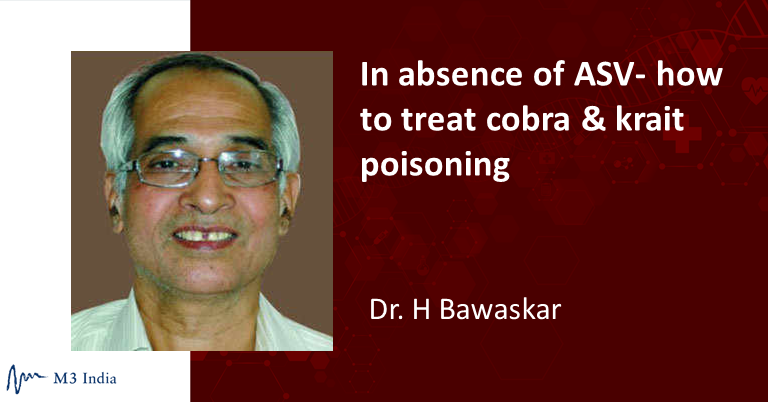'In absence of ASV- how to treat cobra & krait bite and poisoning': Dr. H Bawaskar answers
M3 India Newsdesk Jun 27, 2019
Dr. H Bawaskar provides a quick drug management protocol for elapids (cobra and krait) bite and poisoning, for situations where a clinician might be faced with an absence or unavailability of anti-snake venom (ASV).

Cobra venom is neuro and cardiotoxic. It causes sudden death due to cardiac arrhythmias, heart blocks, and hypotension. Cobra and krait venom block the post-synaptic and pre-synaptic acetylcholine neuromuscular receptor respectively, resulting in descending neuroparalysis and ultimately respiratory depression and death due to hypoxia.
Antivenom neutralises circulating venom, so that minimum venom reaches the receptor site. However, block receptors may not be reversed by antivenom required ventilation support.
There are three fundamental antidotes to venom action:
- Physiological- specific antivenom
- Pharmacological- neostigmine, atropine, and calcium gluconate
- Mechanical antidote- ventilator
All three can be applied simultaneously and may yield good result. Hypotension and cardiac block can be managed by pharmacological agents.
How to treat snake bite and poisoning in the absence of ASV
In case of unavailability of specific antidote ASV one can manage the situation as follows:
- Intravenous neostigmine or atropine is the first drug of choice in cases of postsynaptic receptor blockade caused by cobra bite. Five to eight doses of neostigmine should be given every 30 minutes.
- In krait bite one can try tissue oxygenation- artificial respiration (ventilator) with close monitoring of oxygen saturation.
- Nutrition should be intravenous or by nasogastric feeding tube.
- For correction of serum electrolytes, calcium gluconate should be given by intravenous method 6-hourly to improve the neuromuscular conduction.
- For care of respiratory infections, the patient needs close monitoring for oxgenation, nutrition, and electrolytes balance with repeated examination of consciousness and improvement in the muscle power.
Many patients of krait bite recover with the above management protocol but may require prolonged ventilation for 4 to 6weeks as recovery depends upon the regeneration of destroyed acetylcholine receptors. Hypotension and cardiac block can be managed by pharmacological agents.
This article is part of a series on Snakebite and poisoning. In the other parts, Dr. Himmatrao Bawaskar has dealt with clinical management of snakebites on a species specific level- cobra, krait, and Russel's Viper, provided a quick ASV protocol for snakebite management, and discussed how adverse reactions to anti-snake venom can be treated. Click on the links below to read the other articles in the series.
Krait & Cobra bite: Treatment protocol & Management- Dr. H Bawaskar
Deadlier than cobra? Treatment of the most lethal snake bite
Anti-Snake Venom (ASV) administration for snake bites
Management of Adverse Reactions to Anti-Snake Venom (ASV)
The writer, Dr. Himmatrao Bawaskar is an internationally acclaimed physician whose work has been published in British Medical Journal and The Lancet.
Disclaimer- The views and opinions expressed in this article are those of the author's and do not necessarily reflect the official policy or position of M3 India.
The author did not accept any payment for the article.
-
Exclusive Write-ups & Webinars by KOLs
-
Daily Quiz by specialty
-
Paid Market Research Surveys
-
Case discussions, News & Journals' summaries